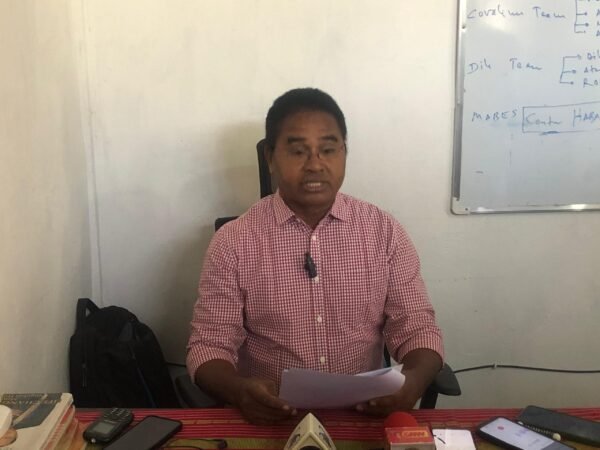Dili, August 13, 2025 (Média Democracia) – Hali ba Dame (HABADA), a civil society organization whose mission is to monitor police governance and human security in Timor-Leste, has issued its assessment of the 2025 recruitment process for National Police of Timor-Leste (PNTL) agents.
Executive Director of HABADA, Abel Amaral, stated that the recruitment process regulated by Ministerial Diploma No. 17/2025 of 25 June is a highly sensitive stage with political weight in the cycle of human resource renewal within the institution.
“The recruitment calendar runs from 5 to 29 August 2025, with document submission taking place between 12 August and 9 September 2025. The 2025 PNTL Agent recruitment, regulated by Ministerial Diploma No. 17/2025, introduces a quota system that allocates: 20% for children of PNTL officers, 20% for children of veterans, 20% for women, and 40% for the general public,” said Abel Amaral.
He added that, while intended to promote diversity and recognition, this model raises public concerns about fairness, nepotism, and discrimination, particularly because the quotas are based on family background, age restrictions of 18–23 years, civil status limitations, and sequential allocation methods.
“Key risks identified by HABADA include: damage to public trust due to perceptions of a ‘family police force’; legal challenges to restrictive criteria; possible reduction in candidate quality when high-scoring applicants are excluded due to sequential quota allocation; and vulnerability to irregularities in documentation and verification,” Abel Amaral explained.
Nevertheless, HABADA also identified opportunities such as special quotas for women to further promote gender equality, honoring veterans, and increasing transparency when the measures are applied effectively.
“HABADA’s priority recommendations to the Ministry of Interior and the PNTL Command are: clarify to the public the purpose of the quotas and the merit criteria through official statements; and publish aggregated recruitment data for each stage of the process,” the Executive Director said.
He added that the Ministry of Interior should appoint independent observers such as the Ombudsman for Human Rights and Justice (PDHJ) and civil society organizations to monitor and report on the recruitment process. The Ministry and PNTL Command should reform quota allocation to ensure proportionality and minimum score thresholds, and review demographic restrictions to promote fairness and inclusivity.
He concluded that the 2025 PNTL recruitment represents both an opportunity for personnel renewal and a test of public trust. With transparent communication, technical adjustments, and strong oversight, the process can shift from controversy toward a model of accountable governance.
Report: Nelfiano
Photo: Nelfiano

